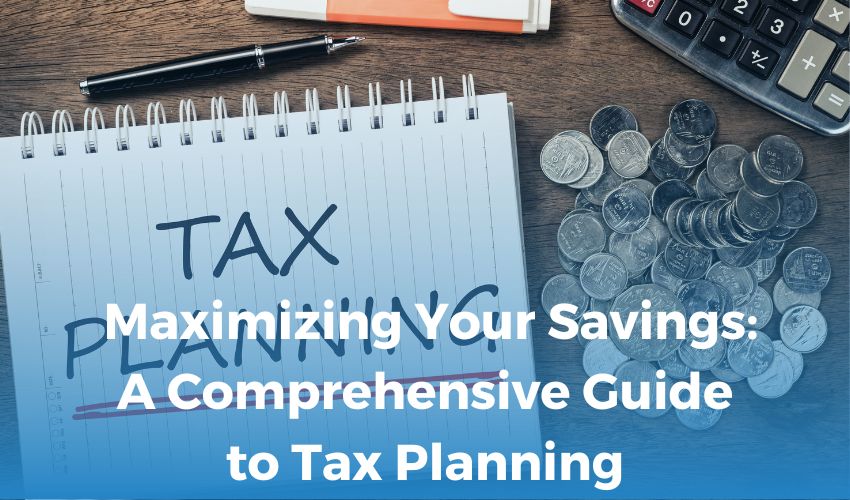

27-10-23
Tax planning is a critical aspect of managing your finances, and it can significantly impact your overall savings and financial well-being. Many people often pay more in taxes than they need to because they are unaware of the various tax-saving strategies available to them. This comprehensive guide aims to help you navigate the complex world of tax planning and maximize your savings legally and ethically. By the end of this article, you will have a clearer understanding of tax planning strategies that can help you keep more of your hard-earned money.
Understanding Tax Planning
Tax planning involves a series of strategies and actions aimed at minimizing your tax liability while staying within the boundaries of the law. It's essential to make a clear distinction between tax planning and tax evasion, as the latter is illegal and can lead to severe consequences. Tax planning, on the other hand, is entirely legal and encourages taxpayers to take advantage of legitimate opportunities to reduce their tax burden.
Tax-Efficient Investment Strategies
One of the most effective ways to reduce your tax liability is by employing tax-efficient investment strategies. These strategies involve investing in assets or accounts that offer favorable tax treatment. Here are some examples:
A. Tax-Advantaged Retirement Accounts: Contributions to retirement accounts like 401(k)s and IRAs can lower your taxable income, which reduces the amount of tax you owe. Additionally, any investment gains within these accounts grow tax-deferred until withdrawal.
B. Taxable vs. Tax-Deferred Investments: When investing, consider the tax implications of your investment choices. For instance, long-term capital gains are typically taxed at a lower rate than short-term gains, so holding onto investments for a longer period can save you money.
Tax Deductions and Credits
Taking advantage of tax deductions and credits can be a powerful way to reduce your tax liability. Some common deductions and credits include:
A. Mortgage Interest Deduction: If you own a home and have a mortgage, you can deduct the interest paid on that mortgage from your taxable income.
B. Education Credits: If you or your dependents are pursuing higher education, you may be eligible for education tax credits like the American Opportunity Credit or the Lifetime Learning Credit.
C. Child Tax Credit: If you have children, you may be eligible for the Child Tax Credit, which can reduce your tax liability.
Tax-Efficient Charitable Giving
Consider these strategies:
A. Itemizing Deductions: If you choose to itemize deductions, you can deduct your charitable contributions from your taxable income, reducing your tax liability.
B. Donor-Advised Funds: Contributing to a donor-advised fund allows you to make tax-deductible donations and distribute funds to charities over time. This can be a tax-efficient way to manage your giving.
Estate Planning
Estate planning is an important aspect of tax planning, especially if you have substantial assets. Without proper planning, your estate may be subject to estate taxes, reducing the amount your heirs receive. Strategies like creating trusts, gifting assets, and taking advantage of the estate tax exemption can help minimize the impact of estate taxes.
Business Tax Strategies
If you're a business owner or self-employed, there are several tax planning strategies available to you:
A. Small Business Deductions: Small business owners can benefit from various deductions, including the Qualified Business Income Deduction (QBI), which can significantly reduce their tax liability.
B. Entity Choice: Choosing the right business structure (e.g., sole proprietorship, LLC, S corporation) can impact your tax liability. Each has different tax implications, so it's crucial to select the one that best suits your needs.
Tax-Loss Harvesting
Tax-loss harvesting involves strategically selling investments that have declined in value to offset gains from other investments. This can be an effective way to minimize capital gains taxes and can be particularly useful for investors in taxable accounts.
Retirement Tax Planning
Proper retirement tax planning can help you maintain your lifestyle in retirement while minimizing your tax liability. Strategies such as Roth conversions and managing Required Minimum Distributions (RMDs) can make a substantial difference in your retirement savings.
Conclusion
Maximizing your savings through tax planning is a combination of understanding the tax code, making strategic financial decisions, and staying informed about changes in tax laws. Remember that tax planning is not a one-size-fits-all approach; the best strategies for you will depend on your individual circumstances and financial goals.
While this comprehensive guide provides an overview of various tax planning strategies, it is essential to consult with a qualified tax professional or financial advisor to tailor these strategies to your specific situation. Tax laws are complex and can change, so staying informed and proactive in your tax planning efforts is key to maximizing your savings while staying within the boundaries of the law. By following these guidelines and seeking professional advice, you can optimize your financial health and secure a brighter financial future.
Tags :













































.jpg)
.jpg)
.jpg)
.jpg)


).jpg)














 Get A Quote
Get A Quote
Leave A Comment